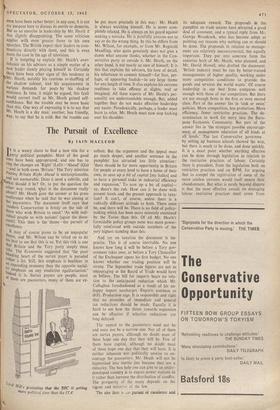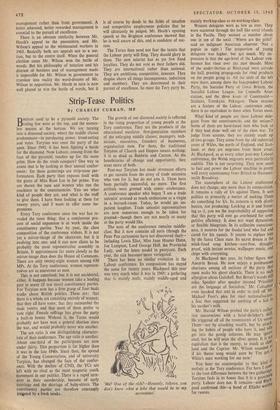The Pursuit of Excellence
By LAIN MACLEOD
IT is a weary chore to find a new title for a party political pamphlet. Most of the good ones have been appropriated, and one has to ring the changes on 'Right' (Left)—`Ahead' (Go) —and in both cases 'Britain.' The Tory selection Putting Britain Right Ahead is unexceptionable, and not memorable. Does it need a subtitle, and 41vhat should it be? Or, to put the question the other way round, what is the document really about? Mr. Heath gave the answer at his press Conference when he said that he was aiming at the pacesetters. The document itself says that modein Conservatism is firmly on the side of those who wish Britain to excel.' As with indi- vidual people so with nations' (again the docu- ment). This then is the theme—the pursuit of excellence.
It may of course prove to be an unpopular Lth.eme, and Mr. Wilson can be relied on to do ms best to see that this is so. Yet this risk is one that Britain and the Tory panty simply must tLake. The Economist suggested that 'the poor bleeding heart of the surtax payer is paraded rather a lot. Still, this emphasis is healthier in rsi expanding economy than the opposite social- it emphasis on any vindictive egalitarianism.' Indeed it is. Surtax payers are people, most 0,. them are pacesetters, many of them are ex- 1"°14 Hill's protesting that the BBC is getting more political time than the 1TA' cellent. But the argument and the appeal must go much deeper, and another sentence in the pamphlet has attracted too little attention: 'there should be far more opportunity in Britain for people at every level to have a home of their own, to save up a bit of capital [my italics] and to have a personal stake in industrial efficiency and expansion.' To save up a bit of capital— ay, there's the rub. How can it be done with present levels and the present approach to taxa- tion? It can't, of course, unless there is a radically different attitude to both. There must be, and there will be. There is no field of policy- making which has been more minutely examined by the Tories than this. Of all Mr. Heath's formidable policy groups none was more power- fully reinforced with outside members of the very highest standing than this.
And yet on taxation the document is im- precise. This is of course inevitable. No one knows how long it will be before a Tory gov- ernment takes over, or before a Tory Chancellor of the Exchequer opens his first budget. No one knows whether our trading position will be strong. The September trade figures are not as encouraging as the Board of Trade would have us believe. The bill for imports bears no rela- tion to the anticipated reduction which Mr. Callaghan foreshadowed as a result of his un- happy import surcharges. Exports continue to drift. Production sags. It is responsible and right that no promites of immediate and general tax reductions should be made. Equally it is hard to see how the thrust towards expansion can be effective if selective reductions are long delayed:
The appeal to the pacesetters need not be and must not be a narrow one. Not all of them are surtax payers, although no doubt most of them hope one day that they will be. Few of them have capital, although no doubt most of them hope one day that they will have. It is neither inhuman nor politically unwise to en- courage the pacesetters. Mr. Heath will not be hypnotised into inertia just because they are a minority. The best help one can give to an under- developed country is to export power stations to it rather than increase the distribution of candles. The prosperity of the many depends on the vigour and initiative of the few.
The aim then is .,ie pursuit of excellence and its adequate reward. The proposals in the pamphlet on trade unions have attracted a good deal of comment, and a typical reply from Mr. George Woodcock, who has become adept at pointing out reasons why nothing can or should be done. The proposals in relation to manage- ment are relatively uncontroversial, but equally important. They put into concrete form the anxieties both of Mr. Heath, who planned, and Mr. David Howell, who drafted the document. 'British industry must be run by better-trained managements of higher quality, working under more competitive conditions to provide the goods and services the world wants.' Of course leadership in our best firms compares well enough with those of our competitors. But there are not enough firms in the first or even second class. Part of the answer lies in 'sink or swim' policies. More competition, less protection. More efficiency, fewer restrictive practices. The de- termination to work for entry into the Euro- pean Economic Community. But part of the answer lies in 'the strongest possible encourage- ment of management education of all kinds at all levels.' The last Conservative governme by setting up business schools showed the way, but there is much to be done, and done quickly. It is a moot point whether anything effective can be done through legislation in relatioh to the restrictive practices of labour. Certainly there is precedent, from the legislation both on restrictive practices and on RPM, for arguing that to compel the registration of some of the more aimless customs would itself ensure their abandonment. But what is surely beyond dispute is that the most effective assault on damaging labour restrictive practices must come from management rather than from government. A better educated, better rewarded management is essential to the pursuit of excellence.
There is an obvious similarity between Mr. Heath's appeal to the pacesetters, and Mr. Wilson's appeal to the whitecoated workers in 1963. Basically both are appeals not to a sec- tion, but to the centre itself. When the general election came Mr. Wilson won the battle of words. But his philosophy of taxation and his distrust of business and of management made it impossible for Mr. Wilson in government to translate into reality the word-dreams of Mr. Wilson in opposition. Mr. Heath in turn is now well placed to win the battle of words, but it is of course by deeds in the fields of taxation and competitive employment policies that he will ultimately be judged. Mr. Heath's opening speech at the Brighton conference showed that he is well aware of this, and is confident of suc- cess.
The Tories then need not fear the taunts that the Labour party will fling. They should glory in them. The new salariat has as yet few fixed loyalties. They do not vote as their fathers did. They are international rather than, national. They are ambitious, competitive, insecure. They despise above all things incompetence. indecision and snobbery. They are determined in their pursuit of excellence. So must the Tory party be.







































 Previous page
Previous page